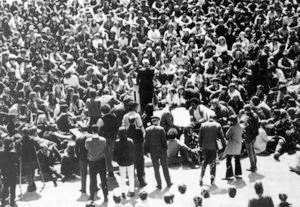History professor unveils FBI spying at Eau Claire
Student groups monitored in ‘60s agency reports

Photo by Submitted
February 11, 2015
In the galaxy of public complaints, UW-Eau Claire leaders probably aren’t juggling messages from infamous FBI Director J. Edgar Hoover, warning of black, militant student groups on campus.
But Leonard Haas, Eau Claire president during the ‘60s, was.
While scouring 200-plus boxes of correspondence from the chancellors and presidents of Eau Claire and its predecessor Wisconsin State University-Eau Claire for the Chancellor’s Centennial History Series, history professor James Oberly came across copied letters from Hoover warning about radicals and the dangers they pose.
That sparked research which will be presented Feb. 18, in the lecture, “FBI Surveillance of Campus Protests at Eau Claire State, 1968-1970.” Michael Grogan, a history graduate student, will be presenting along with Oberly.
Grogan said he became interested in the FBI’s actions as an undergrad, namely in their counterintelligence programs – tactics that could stretch any line of ethics and First Amendment rights.
“A landlord or an employer might receive an anonymous letter indicating that their tenant or employee was a homosexual or a communist,” Grogan said. “The obvious goal of the FBI was to harass those with anti-government views in the hopes that those targeted would decline to express their free speech and political rights.”
Oberly filed a Freedom of Information Act request to obtain evidence of FBI spying in Eau Claire.
He said, as a teaser for the presentation, one of the things that stuck out was a main source of the FBI’s information came from The Spectator.
“So, it’s kind of charming to think that Hoover, or maybe not Hoover himself, read everything,” Oberly said. “There are copies of The Spectator in the FBI’s secret files, which had to be opened under the FOIA, which anyone could have read at the time and anyone could read now.”
The presentation will be from 4 to 5 p.m. Feb. 18, in the Woodland Theater in Davies Center.


